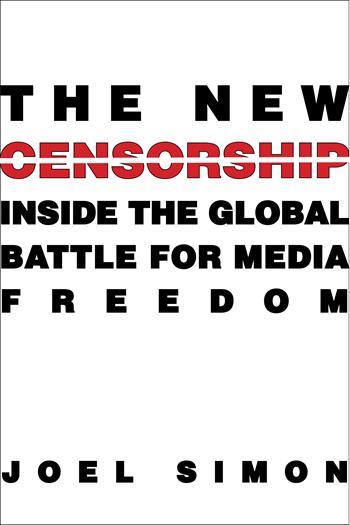George Packer on The New Censorship by Joel Simon
In Why the Press is Less Free Today, a recent article in The New Yorker, George Packer discussed some of the key issues and arguments raised in The New Censorship: Inside the Global Battle for Media Freedom, by Joel Simon.
Packer’s article and Simon’s book come at a time when journalists are increasingly under threat. As Packer writes, between 2002 and 2012, according to the Committee to Protect Journalists (C.P.J.), five hundred and six journalists were killed worldwide, as opposed to three hundred and ninety in the previous decade. Packer comments on the seeming contradiction of more journalists being killed at a time when other freedoms seem to be proliferating:
It seems strange to speak of growing censorship in an era when elections are common around the world, private freedoms have expanded even in repressive countries like China, the Internet and social media swamp our brains with indiscriminate information every nanosecond, and anyone with a Twitter account or a Facebook page can be a journalist. But Simon makes a persuasive case that the global trend is toward less, not greater, freedom of the press. “Deluged with data, we are blind to the larger reality,” he writes. “Around the world new systems of control are taking hold. They are stifling the global conversation and impeding the development of policies and solutions based on an informed understanding of the local realities. Repression and violence against journalists is at record levels, and press freedom is in decline.”
Packer goes on to outline the four main reasons that Simon cites as contributing to “The New Censorship”. The first of which is the rise of “Democratators,” such as Vladimir Putin in Russia or Recep Tayyip Erdoğan in Turkey. These leaders, who rule as dictators but claim to rule as democratically elected leaders. As Packer summarizes, “[They] create tyrannies of the majority, so that the dissenting stance that’s the normal position of an independent press is easily isolated, tainted with foreign associations, and blamed for social ills.”
Terrorism the second major threat to journalists. Terrorists not only physically threaten journalists but also have become providers of information themselves. Terrorists’ ability to disseminate video, get their word out by social media, etc. have made journalists less needed as conduits for their cause and therefore more expendable.
Technology has also made it possible for cash-strapped news organizations to cut back on their foreign bureaus. While many local reporters have come in to fill the gap, their lives and survival are far more precarious and less protected than those of foreign, and particularly Western journalists.
Finally, the rise of global digital surveillance by governments has thrown into question the limits of journalistic freedom. Many journalists, Simon argues have been confronted with the fact that their work and activities are being closely monitored. Packer concludes by writing
Simon’s book confirms an idea I’ve had about the fate of institutions in the information age. Despite its promise of liberation, democratization, and levelling, the digital revolution, in undermining traditional forms of media, has actually produced a greater concentration of power in fewer hands, with less organized counter-pressure. As a result, the silencing of the press, otherwise known as censorship—whether by elected autocrats, armed extremists, old-fashioned dictators, or prosecutors stopping leaks with electronic evidence—is actually easier and more prevalent today than it was twenty years ago.
In America, the press is held in perpetually low esteem, even when it does its job well. Despite the power of the N.S.A. and Google, censorship is not the problem here. We don’t suffer from “democratators” or from simple murder. We suffer from the loss of facts—a body of empirical information that American citizens can accept as a common starting point for public debate. We suffer from the loss of faith that our institutions can be shaken up and reformed under the scrutinizing pressure of an independent press. We suffer from irresponsible leaders and an ignorant public. Democratic erosion takes many forms—the hardest to see can be the ones in front of our faces.



